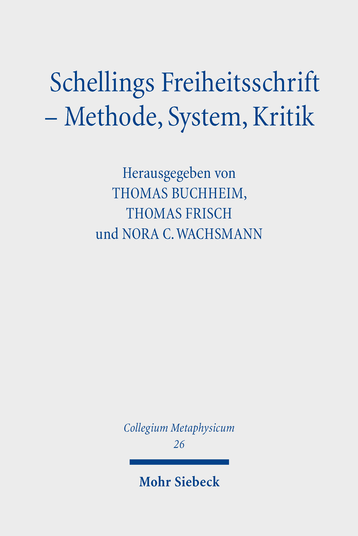We are glad to give notice of the release of the volume Schellings Freiheitsschrift – Methode, System, Kritik edited by Thomas Buchheim, Thomas Frisch and Nora C. Wachsmann (Mohr Siebeck, 2021).
From the publisher’s website:
Schelling’s Freiheitsschrift shows that demonstrating the possibility of human freedom requires us to fundamentally reconceive an unexpectedly wide range of philosophical issues. This volume brings together current perspectives from the international scholarship on Schelling in order to advance the critical evaluation and interpretation of this philosophically rich text.
***
Survey of contents
I. Methode, System und Struktur der Freiheitsschrift
G. Anthony Bruno: Schelling on the Unconditioned Condition of the World
Christoph Binkelmann: Die Logik der Dialektik. Verstand und Wille in Schellings Freiheitsschrift
Tyler Tritten: Freedom Is Necessity: The Onto-Logic of Posterior Anteriority in Schelling’s Freiheitsschrift
Daniel Whistler: The Schlegelian Context to Schelling’s Account of Freedom
Mildred Galland-Szymkowiak: »wie gesprächsweise«: Dialogisches und Freiheit der Person
Christian Martin: Transformativer Personenbegriff und serielle Methode bei Kant und Schelling
Christian Danz: Subjekt – Individuum – Persönlichkeit. Zur werkgeschichtlichen Entwicklung von Schellings Verständnis der Person zwischen 1800 und 1810
Paul Ziche: »Ahndender Wille« und »vermitteltes Wissen«: Schellings ‘höherer Realismus’ in der Freiheitsschrift
II. Die Freiheit und ihr ‘realer und lebendiger Begriff‘
Lara Ostaric: Regaining Subjectivity in Absolute Freedom: Schelling’s Ontological Extension of Kant’s Radical Evil in the Freiheitsschrift
Marcela García-Romero: Unbounded Being: The Distinction Between Existence and Actuality in Schelling’s Ontology of Freedom
Markus Gabriel: Die logisch-ontologischen Grundbegriffe der Freiheitsschrift und das Wesen der menschlichen Freiheit
III. Formelle Freiheit und intelligible Tat
Thomas Buchheim: Schellings Konzept der »intelligiblen Tat«: Kritische Angriffe und Chancen der Verteidigung
Friedrich Hermanni: Ist das Wesen des Menschen »seine eigne That«? Über ein Theorem in Schellings Freiheitsschrift
Siegbert Peetz: Freiheit in Schuld und Strafe. Überlegungen zu Schellings Konzept der intelligiblen Tat
Hiroshi Abe: Schelling und Spinoza über menschliche Freiheit
Ryan Scheerlinck: Intelligible Tat und intelligibles Wesen: Zwischen Kant und Schelling
Nora C. Wachsmann: Freiheit und Geschichtlichkeit. Die Situation der »intelligiblen Tat« bei Kant und Schelling
Thimo Heisenberg: Schelling on time and agency in the Freiheitsschrift and the Weltalter
Thomas Oehl: Freie Charakterbildung in oder jenseits der Zeit? Schellings Konzept der intelligiblen Tat im Spiegel gegenwärtiger Debatten
IV. Moralphilosophische Implikationen und Theodizee
Michelle Kosch: Schelling’s moral psychology in the Freiheitsschrift and Stuttgarter Privatvorlesungen
Amit Kravitz: Einige Bemerkungen zu Schellings Auseinandersetzung mit der ‘Freiheit Gottes’ und ihrem Verhältnis zur menschlichen Freiheit in der Freiheitsschrift
Thomas Frisch: Schellings Theodizee zwischen Leibniz und Plantinga
Karin Nisenbaum: Schelling’s Systematization of Kant’s Moral Philosophy: Divine Craftsmanship as the Human Moral Telos
Printable Version


